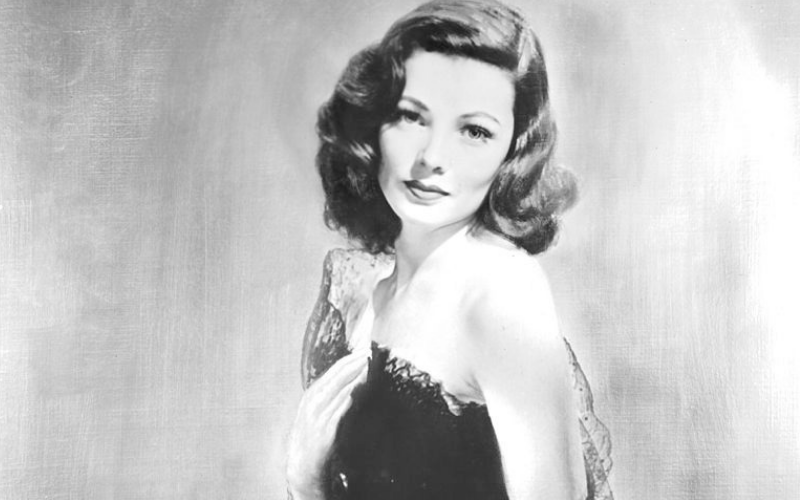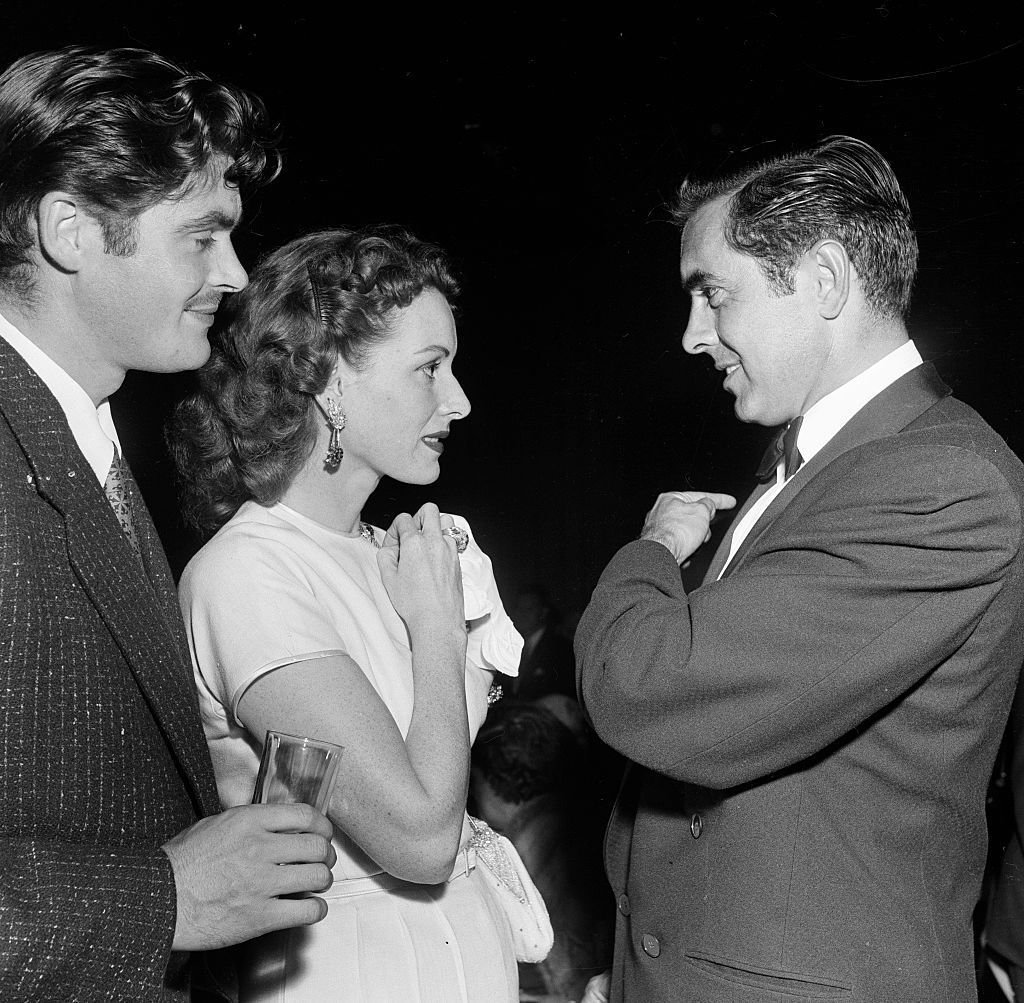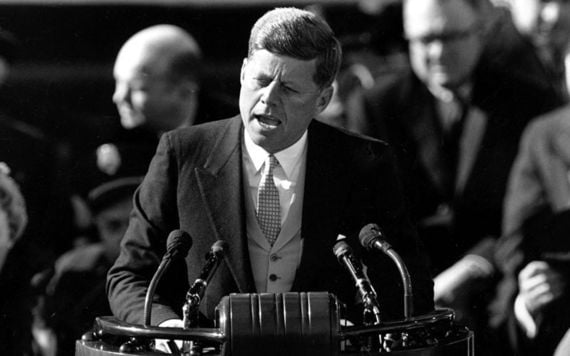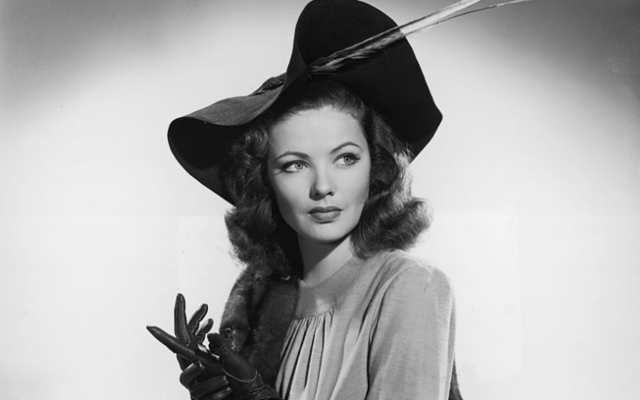JFK and actress Gene Tierney were destined to fail as soon as they started dating.
In 1946 Gene Tierney was one of the hottest actresses in Hollywood. Otto Preminger’s “Laura” had made her a mega-star. She was working with director Joseph Mankiewicz on “Dragonwyck” when he told her, “turn closely and look into the camera.”
“I turned and found myself staring into what I thought were the most perfect blue eyes I had ever seen on a man. He was standing near the camera, wearing a navy lieutenant’s uniform.
"He smiled at me. My reaction was right out of a ladies’ romance novel. Literally, my heart skipped," Tierney wrote in her autobiography, “Self-Portrait” published in 1978
I think this is what romance novelists call “love at first sight.”
“But when the scene was over, I stepped forward to meet the man whose blue eyes had engaged mine, and whose name turned out to be Jack Kennedy…A coy thought flashed through my mind: I was glad I had worn a lavender gown for my scene that day. Lavender was one of my best colors.”
At the time, Tierney was married to fashion designer Oleg Cassini, but the marriage was on the rocks and they were in the middle of divorce proceedings.
“That night I wrote a long letter to my sister. I told Pat I wanted her to meet this strikingly handsome young man from Boston. She wrote back and asked, ‘Who is meant to fall for him, you or me?’”
They met again at the house of skater Sonja Henie. Tierney had come with a date, but Kennedy quickly dispatched the poor man. He took Tierney to an empty room where they intimately danced.
“At one point,” she wrote, “he said, ‘I could dance like this the rest of my life.’ The words did not sound trite at all. I decided right then it would be very easy to fall in love with him. I was half annoyed with myself, as little as we knew one another, but the thought stayed.”
JFK was an Irish charmer
“He had the kind of bantering, unforced Irish charm that women so often find fatal,” wrote Tierney.
“He asked questions about my work, the kind that revealed how well he already knew the subject. His father had once invested in the movies, he told me. He did not mention it, but I learned later that his father had an eye for the actresses of his time, among them Marion Davies and Gloria Swanson. We had dinner together, and then another, and Jack had to leave.”
Besides being Irish, they also had something very important and tragic in common - mentally underdeveloped family members. Tierney had Daria, her daughter, and Kennedy had his sister Rosemary.
“Jack understood,” Tierney wrote. “He told me about his sister Rosemary, who had been born retarded, and how his family had loved and protected her. The subject was awkward for him. The Kennedys did not survive by dwelling on their imperfections. ‘Gene,’ he said after a silence had passed between us, ‘in any large family you can always find something wrong with somebody.’”
Jack was fun
Out on a date one night in Manhattan, Kennedy had an idea. “What shall we do first?” he asked her. She thought a cocktail would be great. “An inspired idea,” agreed Jack.
“I suppose we looked like any other young couple having a reunion celebrating a few months late the end of a war that had gone on too long and cost too much.
"Jack hailed a taxi and quickly noted the driver’s name on his cab license. ‘So you’re a Kelly,’ he declared. ‘Would you be kind enough to take a Kennedy and a Tierney to the Monte Carlo Club in New Jersey? I know it’s against the rules to drive out of New York, but we’re hoping you’ll risk it. How’s your sense of adventure, Kelly?’ The cabbie laughed and said, ‘Well, now, I can’t resist that.’”
They continued dating. “Jack was partial to French restaurants. One night, at the Versailles, in New York, we listened to Edith Piaf sing the love songs that made her famous. One was called Longtemps, a line of which I can still quote from memory: ‘A long, long time after the poets have disappeared, their songs will live in the streets.’ ”
Gene Tierney’s family disapproves

Gene Tierney in publicity portrait for the film 'Laura', 1944. (Photo by 20th Century-Fox/Getty Images)
Even back then, politics and becoming president preoccupied Kennedy’s thoughts. “I don’t recall how many dates Jack and I had,” said Tierney, “not many, before I told my family and a few friends that I had met a young man who would be President someday. That was his goal. He talked about it in a way that was unself-conscious, as another might talk about going to work in his father’s store.”
Gene’s mother was shocked by the political company Kennedy kept. “I could see the drive he had,” Tierney recalled, “the sense of power acquired from being steeped early in Boston Irish politics. On occasion, when we visited my mother at her home in Greens Farms, Jack would have with him one of his ward heelers, hearty, rumpled men who left cigar stubs in her ashtrays. Mother fed Jack milk and cookies in the kitchen, but she could not mask her distaste for his companions and didn’t try. Once she asked [her sister] Pat, ‘Why can’t he get a better class of people around him?’ Pat laughed and said, ‘Mother, he’s a politician. He’s not on a polo team.’”
As the Tierneys looked at young Kennedy, they were sure that they being Republicans and Episcopalians and JFK being a Democrat and a Catholic, a match would be a disaster.
“I was tense,” admitted Tierney, “uncertain how they would react, the first time I took Jack home to meet my family. [Her brother] Butch had heard rumors we might be getting serious, and he did not receive the news gladly. He had done his graduate work at Harvard when Jack was a student there, knew him slightly, and didn’t like him or his politics. We were New England Republicans with a natural suspicion of rich Democrats who take up with the poor.”
“My brother would not even let me in the front door,” Tierney recalled. “He did not feel, he made clear, that there was any future in my dating a Catholic (the Tierneys were Episcopalian). ‘Any girl who is going through a divorce,’ he lectured me, ‘and has a retarded child, has no business looking to have her heart broken any more. I don’t admire you or him for getting mixed up with each other.’”
Kennedy on her mind
Amid all the familial disapproval, Gene couldn’t get Kennedy out of her mind.
“Jack was single and eligible and not yet a national figure,” she wrote. “Still, we tried to keep our romance out of the gossip columns, and for the most part, we succeeded. I visited him once in Washington and sat quietly in the guest balcony while Congress was in session. A reporter spotted me and asked what I was doing there. Thinking quickly, I said that I was studying the government. ‘Oh, some kind of movie project?’ he asked. I nodded. ‘Something like that.’ At that moment Jack picked me out from the floor of the House, waved, and ruined my story. I just didn’t think that dating an actress, at that point, would be very good for his career.”
“I am not sure I explain the nature of Jack’s charm,” she observed, “but he took life just as it came. He didn’t try to hide. He never worried about making an impression. He made you feel very secure. I don’t remember seeing him angry. He was good with people in a way that went beyond politics, thoughtful in more than a material way. Gifts and flowers were not his style. He gave you his time, his interest. He knew the strength of the phase, ‘What do you think? ”
Her husband Oleg Cassini, who would become Jacqueline Kennedy’s favorite designer, worried about Gene. “Oleg knew the Kennedys,” she wrote. “He liked Jack and did not distrust his intentions. But he worried about what was ahead of me. ‘Don’t you understand?’ he said. ‘Jack can’t marry you. No Catholic is going to marry a divorced woman. His family won’t stand for it. Gene, be sure you know what you are doing.’”
Tyrone Power strikes out

Actor Tyrone Power talks with actress Maureen O'Hara during the CBS party of the "Ed Sullivan Show" in Los Angeles,CA. (Photo by Earl Leaf/Michael Ochs Archives/Getty Images)
Tierney was also attracted to another Irishman, fellow 20th Century Fox star Tyrone Power. They had starred in the 1946 hit “The Razor’s Edge,” but, for whatever reason, she was not attracted to Power the way she was attracted to Kennedy. He once gave her a silk scarf. She then informed him that she was going up to Cape Cod to visit Kennedy. All Power could say was, “Have a nice time.” When she looked at the scarf the word “Love” was embroidered on it.
“Ty was warm and considerate,” she remembered. “He had a beautiful face. But I could not fall in love with Ty Power, having met Jack Kennedy.”
The breakup
The Tierney-Kennedy relationship was fraught with electricity. Both were obviously thinking of marriage. It was Kennedy who broke the bad news to her.
“We were having lunch one day in New York. Just before we were joined by some of his friends, he looked at me and said, out of the blue, ‘You know, Gene, I can never marry you.’ In the chatter, the exchange of greetings as his friends settled into other seats, I said nothing. Then it was time for Jack to catch his flight back to Washington. As he moved away from the table, I sat still, and in a voice just above a whisper I said, ‘Bye, bye, Jack.’ He stopped, walked back across the room, and said, his smile a little off-center, ‘What do you mean? That sounds kind of final.’
“‘It is.’ We looked at each other for a long, timeless moment. Then he turned and left to catch his plane.”
A few years later, they met by accident at Maxim’s in Paris. Kennedy asked Gene to dance with him, then asked: “Isn’t it time we started to see each other again?”
“I said, no, not for me,” Tierney wrote. “I was too crazy about him to risk renewing something that could only end by hurting us both. Less than six months later, I read of his marriage to Jacqueline Lee Bouvier, a bride I felt sure his parents approved of.
“From the beginning, I should have known our situation was hopeless. I have never talked with reporters about Jack, and until now had never written about us. Only he knew how serious his feelings were. But, obviously, when a man tells a woman he can’t marry her, if he feels compelled to say so, then the subject must have been on his mind.”
Friends until the end

JFK on his inauguration. Image: YouTube.
In the 1950s, Gene Tierney suffered from mental illness and underwent shock therapy. She ran into Kennedy at El Morocco in New York in 1956 and, again, they danced.
The next day he visited her at her mother’s apartment. Momma Tierney was afraid to leave the married Kennedy alone with her daughter. “Finally,” she wrote, “Jack smiled and suggested we go for a walk. Outside, under the street lights, we talked about my illness. I told him I had begun to realize that I was one of those people who cannot handle problems and disappointments by trying to work harder.”
But their romance was definitely over. “No one really broke up our relationship,” she confessed in her memoir, “not Jack’s father nor his mother nor my family. I did not date him again because I knew the consequences would not be happy ones. In truth, ours was a sweet but short-lived romance. When I met him he was a serious young man with a dream. He was not a womanizer, not as I understand the term…In the years after we met, and since his death, I have thought often about the charming navy lieutenant who went on to become our youngest President. I wore my heart on my sleeve for a long time. But what digging I do now in the past is an effort to explain my life, not his.”
When Kennedy was elected the 35th president in 1960 Tierney sent him a telegram: CONGRATULATIONS, I KNEW YOU WOULD MAKE IT.
What she didn’t tell her erstwhile lover is that she had voted for Richard Nixon.
Dermot McEvoy is the author of "The 13th Apostle: A Novel of Michael Collins and the Irish Uprising" and "Our Lady of Greenwich Village," both now available in paperback, Kindle, and Audio from Skyhorse Publishing. He may be reached via email, on his website, and Facebook page.




Comments